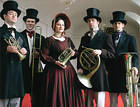ORFEO International – Reviews
Important Releases Briefly Introduced
October 2007
ORFEO 1 CD C 689 061 A
A Victorian Christmas
Charles Dickens notwithstanding, today’s readers will probably prefer not to have received their Christmas presents in England during the Industrial Revolution. The notion that even around factories, cotton mills and mines the polluted air was filled with the sound of brass bands playing well-known Christmas carols will be only vaguely heart-warming, so it is good that thanks to the CD age listeners can enjoy this release in the comfort of their own four walls. Of course, merely listening to this music cannot protect against the lung diseases that Victorian factory owners thought they could prevent their workforce from succumbing to by encouraging them to learn to play brass instruments.
The wind quintet Passion de Cuivres 
Passions des Cuivres
Foto: Tobias Kadewas formed in 2003 and has already received its patent of nobility from Nikolaus Harnoncourt, who has praised the group for its authentic use of period instruments in reviving this two-hundred-year-old tradition of performing chamber music written for brass ensembles. In addition to traditional carols by William Sandys (1792–1874), Lewis Henry Redner (1830–1908) and Lowell Mason (1792–1872), justice is done to the high standards of amateur groups in the 19th century by including arrangements of Baroque and Romantic choral numbers by composers as diverse as Purcell, Handel and Mendelssohn. In addition to cornets, horns and trombones, the listener will even hear an ophicleide, a kind of bass horn that was a forerunner of the euphonium. This instrument really comes into its own in an arrangement like that of Polyphemus’s aria „O ruddier than the cherry“ from Handel’s Acis and Galatea, where the listener will be struck by its jaunty flexibility. In general, the music-making of Passion des Cuivres is marked by lighter timbres than those produced by modern instruments. The sound spectrum of the present CD is further extended by the soprano Constanze Backes and by the bells of St Andrew’s Church, Sonning near Reading, which have been cast over a period of three centuries, their sounds guaranteeing an atmospheric beginning and end to this musical journey.
These spirited and frequently refreshingly witty arrangements of popular and – at least outside Great Britain – less well-known pieces of music are designed, therefore, to warm the cockles of hearts depressed by the thought of Christmas.
top |